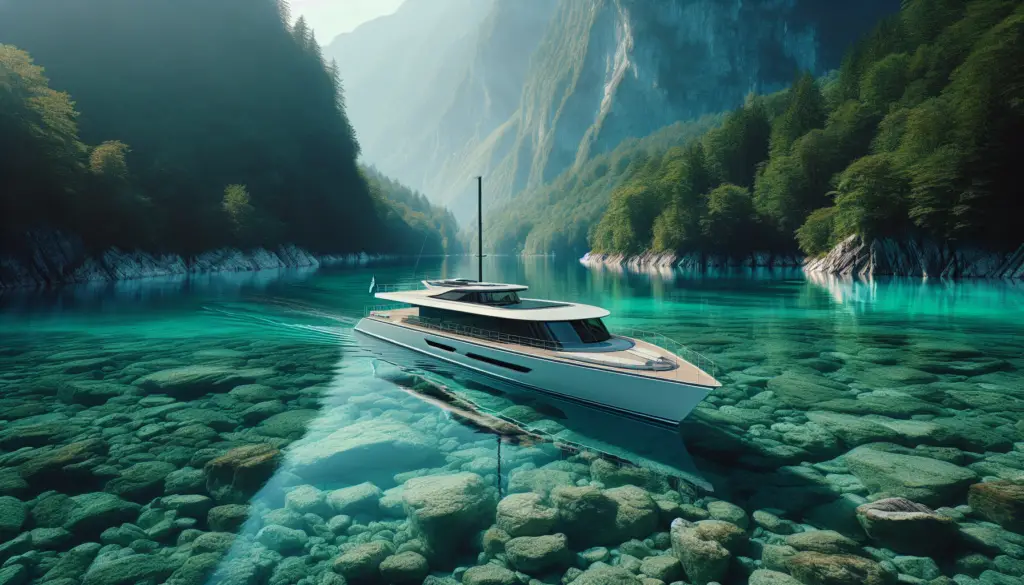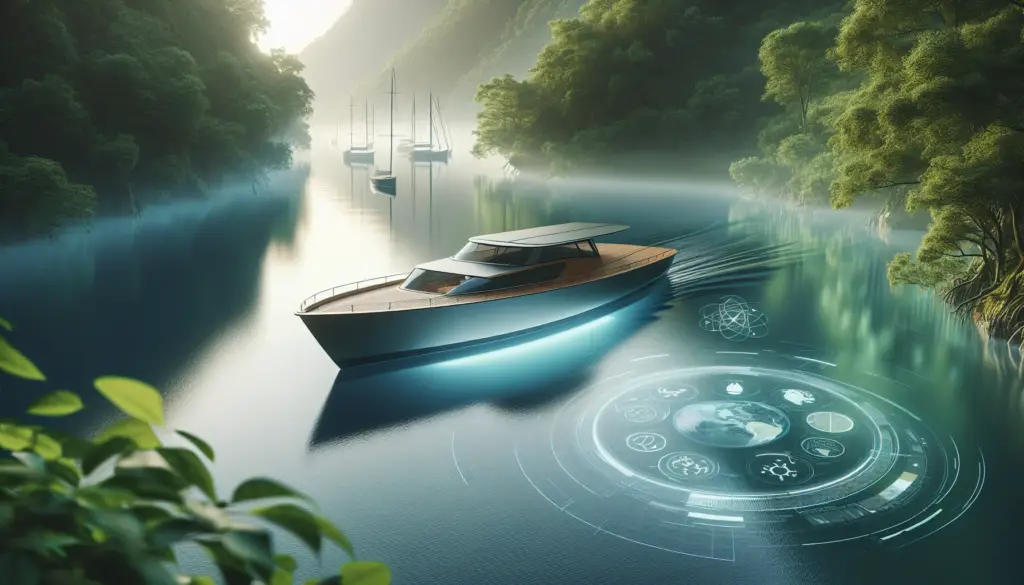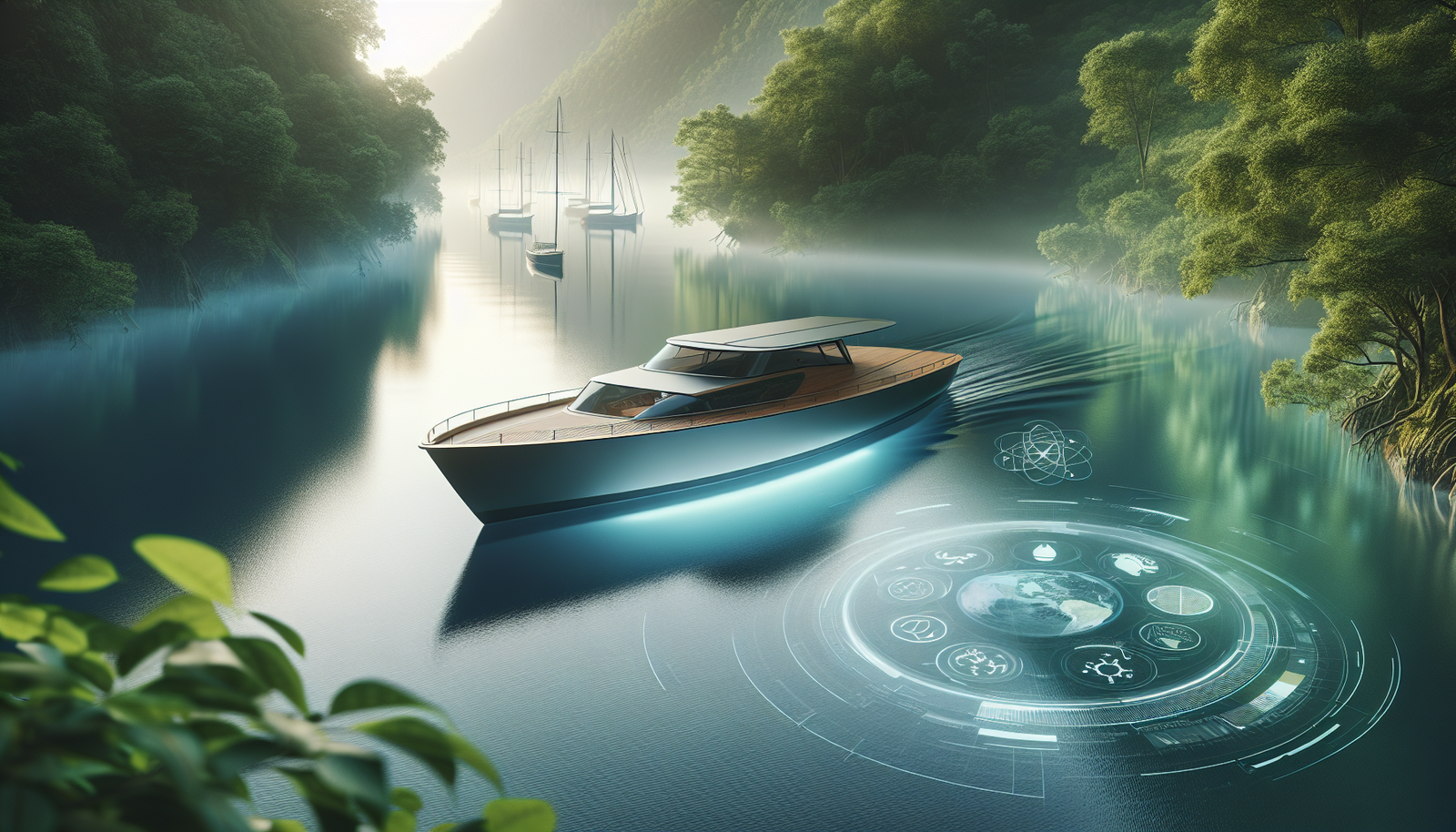Imagine you’re cruising on your boat, taking in the natural wonders that surround you and feeling a wave of tranquility wash over you. You love boating, but you’re also conscious about its impact on the environment, especially when navigating sensitive areas. This article, “eco-friendly boating Solutions For Navigating Sensitive Areas,” offers a shining beacon of hope. It not only highlights some current issues with traditional boating practices, but it also sheds light on innovative and eco-friendly solutions that can significantly reduce your boat’s carbon footprint. This way, you can feel even better about your passion for boating, knowing that you’re making a difference and protecting the very essence of what makes boating so incredible – the untouched, natural beauty of water environments. It’s all about enjoying your favourite pastime responsibly and sustainably.

Understanding Sensitive Marine Ecosystems
Marine ecosystems are incredibly complex and delicate environments, teeming with diverse life forms and playing an essential role in maintaining the balance of our planet’s climate and environment. The health and stability of these ecosystems directly influence the wellbeing of the Earth and its inhabitants. Certain marine areas are particularly vulnerable to disruption and degradation due to their unique composition and inhabitant species. These are known as sensitive marine areas.
Characteristic features of sensitive marine areas
Sensitive marine areas often possess distinctive features that differentiate them from other marine ecosystems. These can include high biodiversity, unique habitats, as well as susceptible or endangered species. They can also be characterized by their geographical, biological, and ecological properties. Coral reefs, seagrass beds, mangroves, and oceanic trenches are examples of such areas. These environments are remarkably fragile and can be easily damaged by human activities or natural phenomena.
The impact of traditional boating on marine ecosystems
Unfortunately, traditional boating practices have historically had a significant detrimental impact on marine ecosystems, especially the sensitive ones. Noise pollution, oil and fuel spills, improper disposal of waste, and physical damage due to anchoring are just a few examples. Moreover, the cumulative effect of these actions can lead to severe degradation of the ecosystem, loss of biodiversity, and can even threaten the survival of certain species.
The importance of eco-friendly boating in preserving sensitive marine ecosystems
In light of these damaging impacts, the importance of eco-friendly boating cannot be underscored. It involves adopting practices that minimize the harm to marine ecosystems, while still allowing us to enjoy the wonders of the ocean. This includes using green technology, adhering to regulations and guidelines, and educating ourselves about marine conservation. Not only does it protect these precious environments, but it also ensures a healthier and more sustainable future for our seas and oceans.
Challenges of Navigating Sensitive Areas
Navigating sensitive marine areas comes with its own set of unique challenges that require careful and conscious navigation.
Environmental hazards and risks
Sensitive marine areas often have various environmental risks and hazards. This could include strong currents, extreme weather conditions, hidden reefs, or presence of fragile ecosystems that could easily be disrupted. Therefore, navigating these areas with traditional craft can further threaten these sensitive environments.
Legal restrictions and guidelines
Many sensitive marine areas have legal restrictions and guidelines designed to protect them. These can vary from restrictions on speed, wake, and noise levels, to total bans on entrance. These regulations need to be thoroughly understood and adhered to.
Local knowledge and skills required for sustainable navigation
Navigating sensitive marine areas also requires specific local knowledge and skills. This includes understanding local tides, weather patterns, currents, and knowledge about specific spaces within these ecosystems that should be avoided. Proper training and education are thus vital in ensuring sustainable navigation.

Eco-Friendly Boat Designs and Structures
The design and structure of boats plays a significant role in determining their impact on the environment. There are many ways in which boat designs can be made eco-friendly.
Incorporation of renewable energy sources like solar and wind in boat designs
Renewable energy sources like solar and wind power are becoming increasingly popular in boat design. These technologies, such as solar panels and wind turbines, can provide a renewable and clean source of power for the boat’s systems, reducing its reliance on fossil fuels.
Implementation of lighter materials to reduce fuel consumption
Using lighter materials in boat design can significantly reduce the amount of fuel needed to power the boat. This not only reduces the boat’s carbon emissions but also decreases the amount of pollution released into the environment.
The role of hydrodynamic design in enhancing fuel efficiency
A boat that is designed with hydrodynamics in mind can move through the water more efficiently, using less fuel. This includes the shape of the boat, the layout of its hull, and the design of its propellers.
Importance of regular boat maintenance
Regular boat maintenance is crucial to keeping a boat running efficiently and eco-friendly. This can include regular engine checks, cleaning, and anti-fouling measures to keep the boat’s structures in good condition and prevent unnecessary harm to marine ecosystems.
Use of Green Propulsion Systems
Replacing conventional boat propulsion systems with greener alternatives can significantly reduce the environmental impact of boating.
Electric and hybrid propulsion systems
Electric and hybrid propulsion systems are becoming increasingly common in the boating industry. These systems use electric motors powered by batteries, which can be recharged through renewable sources like solar or wind power.
Biodegradable lubricants and eco-friendly antifouling paints
Lubricants and paints are crucial for the smooth operation and maintenance of a boat. However, they can also be a source of pollution. Biodegradable lubricants and eco-friendly antifouling paints are a green alternative that minimizes this impact.
Use of renewable biofuels
Biofuels made from renewable sources such as plant oils or animal fats can be a more sustainable alternative to traditional fossil fuels. These biofuels can be used directly in diesel engines or in combination with traditional fuels.
Fuel efficient outboards and sterndrives
Newer generations of outboards and sterndrives are designed to be more fuel-efficient and release fewer pollutants. Investing in these systems can be an excellent way to make your boat more eco-friendly.

Implementing Safe and Sustainable Boating Practices
Safe and sustainable boating practices can substantially contribute to the preservation of marine ecosystems.
Minimizing wake and noise pollution
Large wakes can lead to shoreline erosion, disrupt marine life, and even damage other vessels. Noise pollution can also cause distress to aquatic wildlife, disrupting their communication and altering their behaviour. Boaters should strive to minimize wake and noise pollution, particularly in sensitive marine areas.
Responsible waste management onboard
Boats produce multiple forms of waste, from sewage to greywater to trash. Proper waste management is crucial to prevent this waste from polluting marine environments. This includes using onboard waste treatment systems, avoiding the use of single-use plastics, and disposing of trash at designated marina facilities.
Observing speed regulations and restrictions
Speeding boats can pose a range of hazards, both to the environment and other boaters. They can cause damage to marine habitats, disturb wildlife, and create dangerous waves. Following speed regulations and restrictions can help minimize these impacts.
The impact of anchor placement on the sea-floor ecology
Anchors can cause significant damage to the sea floor, particularly in areas with delicate habitats like coral reefs or seagrass meadows. Boaters should be mindful of where and how they anchor, consider using mooring buoys where available, or alternative anchoring solutions such as eco-anchors.
Eco-Friendly Navigation Tools
Innovations in navigation tools are making green boating not just viable, but increasingly convenient and effective.
Use of digital navigation tools to reduce paper waste
Digital navigation tools, such as GPS and chartplotters, can significantly reduce the need for paper charts. Not only are these tools more accurate and convenient, but they also help reduce paper waste.
Energy efficient electronic equipment
Energy efficient electronic equipment allows boaters to reduce their energy consumption, thus minimizing their environmental impact. This includes navigation instruments, lighting systems, and onboard appliances.
Incorporating eco-route planning softwares
Eco-route planning software can help boaters plan the most efficient—and therefore the greenest—route. This can lead to significant fuel savings, reducing both costs and environmental impact.
Promoting Satellite-based navigation systems to enhance fuel efficiency
Satellite-based navigation systems can provide more accurate and efficient navigation, leading to reduced fuel consumption and emissions. These systems can be particularly useful in difficult or unfamiliar waters.

Green Boating Certifications and Standards
Green boating certifications and standards are a tool for recognizing and promoting environmentally friendly practices in the boating community.
Understanding global green boating standards
Several global initiatives and standards set benchmark criteria for green boating. These guidelines cover a range of issues, from waste management and energy efficiency to sustainable design and operation practices.
Benefits of acquiring green boating certifications
Acquiring a green boating certification demonstrates commitment to sustainable practices and may offer several benefits. These can include reductions on marina fees, improved brand image, better resale values, and in some cases, compliance with legal requirements.
Effective eco-checks for boats and marinas
Regular eco-checks are an essential part of maintaining green boating standards. These checks can include reviewing energy use, waste management procedures, and evaluating the boat’s overall environmental footprint. They provide a point of reference for continual improvement and alignment with green standards.
Role of Technology in Eco-friendly Boating
Technology continues to play a significant role in promoting eco-friendly boating by offering a multitude of solutions and enhancements to boating practices and designs.
Advancements in green marine technology
There have been significant advancements in green marine technology in recent years. These include the development of clean energy propulsion systems, waste treatment devices, biodegradable products, and efficient designs and materials.
Smart tech solutions for sustainable boating
Smart technology offers a range of solutions for sustainable boating. This includes intelligent navigation systems, energy-consumption monitoring devices, and remote monitoring systems that enable optimizing the boat’s overall performance for maximum efficiency and minimum environmental impact.
Future trends in eco-friendly boating technologies
Looking ahead, trends indicate that eco-friendly boating technologies will continue to evolve and improve. Increased production of electric boats, more efficient and affordable solar panels, and advancements in battery technologies are among the possibilities. Additionally, smart technology and AI could bring unprecedented improvements in resource management and navigational capabilities.
Importance of Green Boating Education and Training
For green boating initiatives to be successful, there needs to be a shift in mindset, and this can be facilitated through education and training.
Awareness programs and workshops on environmentally friendly boating
Awareness programs and workshops can play a crucial role in spreading knowledge about the need for green boating, and the practical steps that can be taken towards it. They provide a platform for sharing best practices, discussing challenges, and inspiring commitment to green boating practices.
Training programs for skippers and crew on sustainable practices
Specialised training programs can equip skippers and crew members with the knowledge and skills needed to operate boats in an environmentally friendly manner. This includes a wide range of subjects—from eco-navigation and efficient operation to waste management and marine conservation.
Promoting e-learning and virtual reality training
As technology improves, new methods of education and training are emerging. E-learning and virtual reality training can provide immersive and flexible learning experiences, making it easier for individuals to acquire the skills and knowledge necessary for green boating.
Case Studies of Successful Eco-friendly Boating Initiatives
Case studies of successful eco-friendly initiatives provide valuable insights into the practical application of green boating practices.
Notable green marinas around the world
Green marinas across the globe serve as exemplary models for sustainable practices. They demonstrate how holistic approaches—from waste management and energy conservation to marine conservation efforts—can make a significant difference in preserving marine biodiversity.
Examples of sail and solar power integration in boating
There are several successful examples of integrating sail and solar power into boating. These cases show the viability of renewable energy as a primary or auxiliary power source, contributing to the considerable reduction in carbon emissions and noise pollution.
Innovative eco-friendly boating solutions and their impact on marine conservation
Innovative solutions such as biodegradable boats, electric water taxis, or self-cleaning hull coatings have made a significant impact on marine conservation. Each of these initiatives shares a common goal—to ensure that the marvels of the ocean can be enjoyed by generations to come, in a way that respects and preserves its fragile ecosystems.


[…] polluting the pristine waters. Sounds intriguing, right? That’s the promise of the future of sustainable boating, a world that enthusiastically blends environmental responsibility with pioneering advancements and […]
[…] Marine protected areas can bear a disproportionate burden from boat engine exhaust. Adopting stricter regulations for these areas can help protect the precious ecosystems they harbor. […]